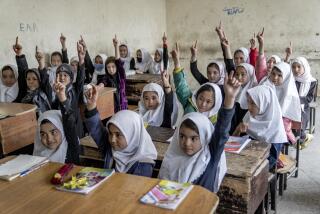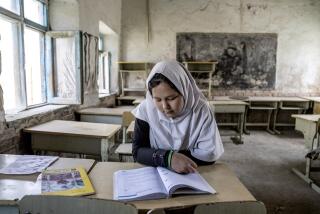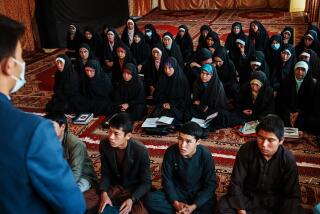Afghan Schools to Get an Education
NEW YORK — The problem is one of the most difficult facing education: how to rebuild Afghanistan’s shattered school system after isolation under Taliban rule and 23 years of war.
More than 100,000 teachers fled the country. Computers and the Internet are unfamiliar to vitally needed personnel. Many school buildings are in ruins. In some cases, classes are held in fields where students sit on mats.
Despite these hardships, Education Ministry officials expect 5.8 million students to attend classes when the school year resumes this week. When schools opened for the first time in 2002, 3 million pupils arrived -- double the number expected.
In a far-reaching partnership, Teachers College at Columbia University will work with Afghanistan’s government and the United Nations to help create a modern school system in the country struggling to recover from the ravages of war.
Representatives of the three groups met privately in New York this month to strategize. The goal is more than up-to-date instruction.
“Afghanistan is committed to establishing a national educational system as the primary means of building a strong and unified country,” a memorandum of understanding drafted during the three days of meetings stated.
The participation of Teachers College at the request of the government in Kabul renewed an old relationship. For almost a quarter of a century, the institution in Upper Manhattan worked with educators in Afghanistan to improve schooling before war interrupted the endeavor.
Central to the new effort will be creation in Kabul of a National Academy of Education, which will concentrate on curriculum development, strategic planning and training for instructors.
Teachers from education colleges in Afghanistan’s 32 provinces will participate in programs at the academy. They will return to their local colleges as mentors.
Classroom instruction will stress such traditional subjects as literacy, social studies, languages, science and math. Also planned are topics dealing with situations such as land-mine recognition, drug abuse and terrorism.
Attention will be paid to the academic achievements of women, their access to occupations and their place in society.
Teachers College will have offices at the academy in Kabul and will play a major role in the rebuilding process, contributing expertise in strategic planning, teacher training, curriculum development, long-distance learning and technology for the classroom.
“The teachers have been cut off from the world -- no research, no library, no Internet, no nothing,” said Saqib Najmudin, an official of Afghanistan’s Ministry of Education who traveled to New York on behalf of the ministry’s leader, Mohammed Yunus Qanooni. “They need to upgrade their knowledge, they need structure, technical assistance.”
In an interview, Najmudin said the Afghan government regards education as a key element -- if not the central core of nation-building, and “the only way to fight drugs, to fight illiteracy, to fight poverty and to get Afghanistan connected with the world.”
“Without it, there is no development. There is nothing,” he said.
“UNICEF came in right after the war in Afghanistan and decided to make education the leading program for nation-building,” said Richard Navarro, chief of the United Nations Childrens Fund’s effort to improve school systems in the country.
“Because of the tremendous desire for education, it was really the foundation for rebuilding society,” said Navarro, a former dean of education at Cal Poly Pomona.
“The biggest challenge is you have a school system that is based on 1980 knowledge and preparing children for a 2003 world,” said Barry Rosen, chief public affairs officer at Teachers College who is playing a major role in the effort that has included at least four faculty members from various disciplines.
During meetings at the home of Teachers College President Arthur Levine, participants expressed worry that the desire to aid Afghanistan was disappearing from national agendas as war in Iraq looms. The danger, they warned, was that the nation could slip back into factionalism, extremism and violence.
The memorandum of understanding between Teachers College, UNICEF and the Afghan government urged nations to provide “major support” to ensure rebuilding succeeds.
“Historically, Teachers College has seen international education as a mission,” said Ruth Vinz, a professor of teacher education who is deeply involved in the Afghanistan project. “There was a Teachers College-Afghanistan partnership from 1954 to 1978.... We took a role in the ‘60s in helping establish a college of education in Kabul.
“Teachers College has been very much involved in international education,” Vinz said. “It may be the most important humanitarian project we can undertake.”
More to Read
Sign up for Essential California
The most important California stories and recommendations in your inbox every morning.
You may occasionally receive promotional content from the Los Angeles Times.










